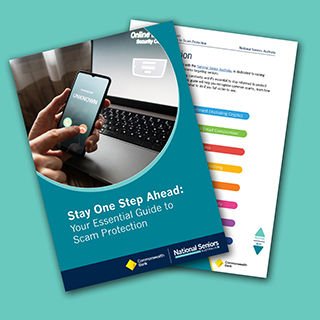
Scams
Awareness
National Seniors Australia and Commbank have come together to provide you with the latest scams information so that you can stay safe

Stop
Does a call, email or text seem off? The best thing to do is stop. Take a breath. Real organisations won’t put you under pressure to act instantly.

Check
Ask someone you trust or contact the organisation the message claims to be from.

Reject
If you’re unsure, hang up on the caller, delete the email, block the phone number. Change your passwords.

CommBank, in partnership with the National Senior Australia, is dedicated to raising awareness and preventing scams targeting seniors. Protecting you is our priority. As scams and fraud continue to rise, we’re more committed than ever to keep your hard earned safe. Through informative workshops, resources, and support, we aim to help you understand ways you can protect yourself online.

National Seniors Australia and Commbank have come together to provide you with the latest scams information so that you can stay safe.
Register your interest in becoming a trainer, at your branch, for scam and fraud education. Scams are increasingly impacting Australians, with seniors being particularly vulnerable.
As a trainer, you will educate others about common scams, such as phishing, fake investments, and identity theft, and provide essential tips on staying safe.

You see any suspicious activity on your account.

A card, cheque, mobile phone or other payment device is lost or stolen.

Your PIN, password or any other banking codes have become known to someone else.

You've given bank details or codes to an unknown caller, or entered them to a suspicious website.
What to do if you’ve been scammed?
Scams can cause emotional harm and financial hardship. If you think you’ve been scammed:
- immediately stop any contact with the scammer
- report the scam to ReportCyber or Scamwatch as soon as you can
- contact your bank or financial institution to cancel all cards and accounts that may have been breached.
- write down any details you get about the scammer (phone number, email, website address or car registration plate number) to help with any investigations
- tell your colleagues, friends and family about your experience and what you’ve done about it.
Replacing Government documents
Contact ID Support to replace your NSW Government proof of identity if your credentials are stolen or fraudulently used.
For those outside of NSW, Contact ID Care
How to create a strong password?
- Use a mix of letters, numbers, and symbols.
- Use as many characters as possible: longer passwords are harder to crack.
- Avoid easily guessed information like your address, birthday, or common phrases.
- Consider a passphrase: use words to tell a memorable story. For example: MyP3tGo@tL0v3sC@tS. It tells a silly story that’s easy to remember, while increasing the unpredictably of your password and making it difficult to guess.
- Test the strength of your password using the governments password checker
| Type of Scam | How to Report |
|---|---|
| If you’re the victim of identity theft or cybercrime | For help call ID Support NSW on 1800 001 040 or complete an online form. For those outside of NSW, Contact ID Care |
| If the scam originates in NSW and you know the name of the business or trader | Make an online complaint to NSW Fair Trading or call 13 32 20 |
| If you are not sure about where the scammers are from | Report the scam to the Australian Competition & Consumer Commission (ACCC) |
| For overseas or interstate scams | Report the scam to the Australian Competition & Consumer Commission (ACCC) |
If you’re a CommBank customer, you can contact CommBank on 13 22 21.

Stay one step ahead of scammers by arming yourself with knowledge and taking proactive measures. Download our comprehensive Scam Protection E-Guide today to learn how to recognise, avoid, and respond to scams effectively. Protect yourself now – download the guide and share it with your friends and family.
Thank you for your interest. Your e-guide will be delivered via email shortly.





